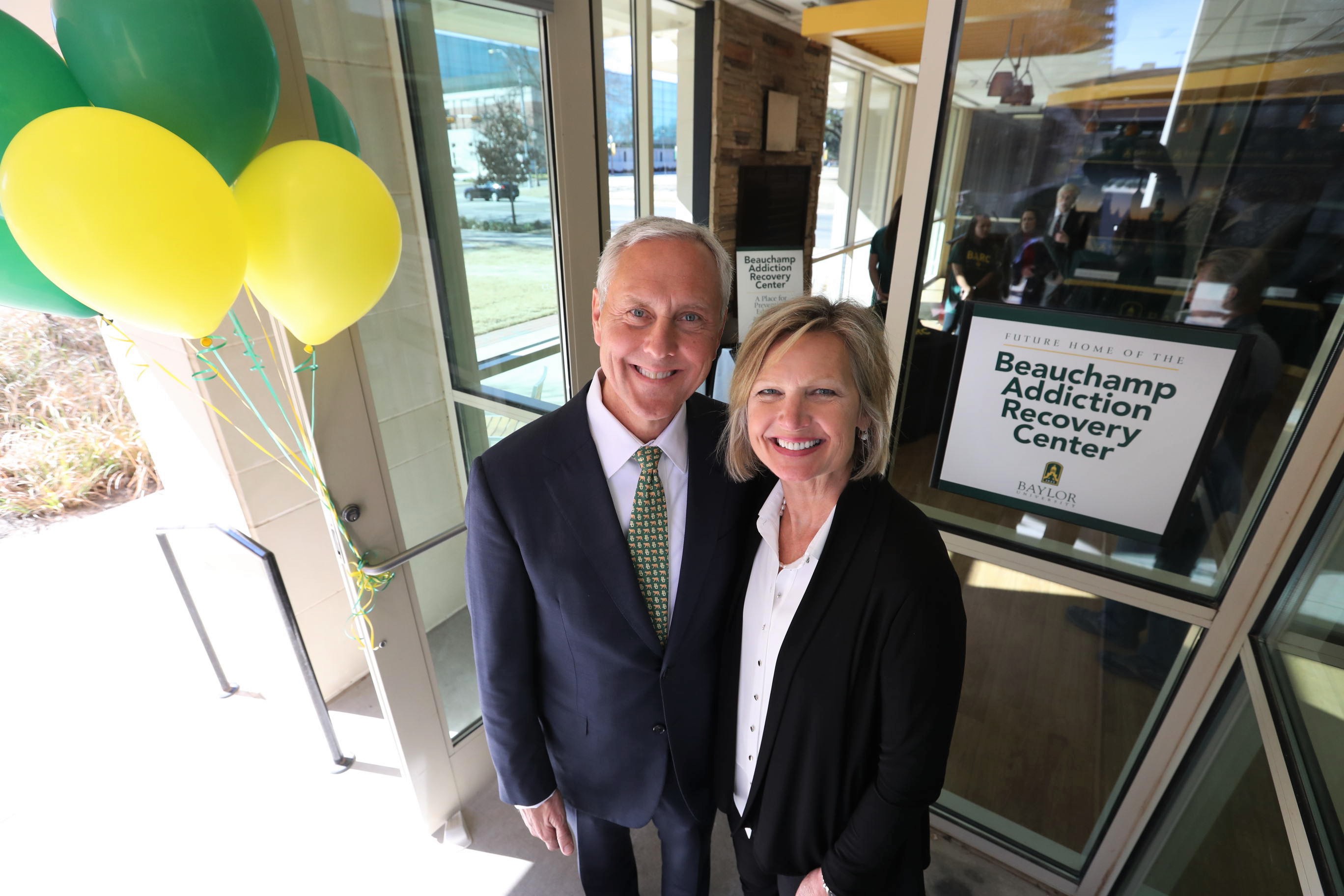Beauchamps Named Recovery Philanthropists of the Year by the Association of Recovery in Higher Education

Bob and Laura Beauchamp of Houston, whose gift to Baylor University in 2017 helped established the Beauchamp Addiction Recovery Center (BARC) on campus, were honored as Recovery Philanthropists of the Year by the Association of Recovery in Higher Education. (Robert Rogers/Baylor University)
Bob and Laura Beauchamp’s $2.5 million gift to Baylor in 2017 created the Beauchamp Addiction Recovery Center
Media Contact: Lori Fogleman, 254-710-6275
Follow Lori on Twitter at @LoriBaylorU
Follow Baylor Media Communications on Twitter: @BaylorUMedia
WACO, Texas (July 11, 2018) – Baylor University today congratulates Bob and Laura Beauchamp of Houston on being named Recovery Philanthropists of the Year by the Association of Recovery in Higher Education (ARHE) at a ceremony held Monday night at the University of Houston Student Center.
The Beauchamps joined a number of other individuals, including Former U.S. Surgeon General Vivek Murthy, who were recognized at the event by the ARHE and the Association of Recovery Schools (ARS) for their outstanding work and service in the recovery field at the ARHE/ARS Awards Ceremony and Gala.
In January 2017, the Beauchamps made a $2.5 million gift to Baylor that allowed the University to create the Beauchamp Addiction Recovery Center (BARC), located in East Village Residential Community on Baylor’s campus.
“We join the ARHE in expressing gratitude for the profound impact Bob and Laura Beauchamp have made on the Baylor community through their passion-driven philanthropy,” said Baylor President Linda A. Livingstone, Ph.D. “Through the resources provided by the Beauchamp Addiction Recovery Center, our students have been empowered to overcome their challenges and fully realize God’s calling in their lives. Raising awareness about substance use disorders and supporting addiction recovery is an important component of Baylor’s Christian mission.”
The multifaceted resources offered to the campus community by the BARC during the past year have dramatically enhanced Baylor’s efforts to foster the holistic well-being of its students in a manner that reflects the University’s values as a Christian community where wholeness, spiritual growth and academic success are priorities.
“Laura and I are honored to be a part of Baylor’s commitment to removing the issues surrounding addiction, increasing awareness and prevention and facilitating recovery,” Bob Beauchamp said. “With Baylor’s support, students affected can reclaim their lives and continue on to fulfilling futures. We are proud that Baylor is being recognized as a leading university for embracing this program that is growing nationwide.”
The BARC opened during the fall 2017 semester and immediately began providing both support services for students who are in the initial stages of identifying an addiction and continued support for students who have completed rehabilitation programs. By the end of the spring 2018 semester, 53 students with around-the-clock access to the BARC were involved in the community and regularly attending meetings. During the past year, the Center also has served as an educational resource, helping to reduce issues surrounding addiction and empower all students to serve as advocates and sources of support for students in recovery.
“The BARC has become a safe environment for students in recovery to create a community of people committed to staying abstinent,” said Lilly Ettinger, assistant director of wellness at Baylor. “Having therapy dogs come into the Center twice a month has served as a wonderful therapeutic tool and also has proven to be a great advertising tool. Some of our therapy dog events had 80-100 students attend from all parts of campus, and they have served as an entry point for a number of students seeking information about recovery, while also providing other students an opportunity to better understand addiction and how to support one another.”
Ettinger noted that among the 53 students actively participating in the BARC’s support system during the 2017-18 academic year, three students graduated in December and another 16 graduated in May, achieving their dream of earning a Baylor degree. The BARC is a central component of the Baylor Recovery Program, which encompasses a dynamic array of on-campus recovery services to support students and strengthen prevention education and intervention support. These services include weekly support and community recovery meetings, recovery coaching and conversations with mentors as well as campus-wide educational outreach efforts that identify social environmental influences, provide education on the support services that are available at Baylor and encourage peer-to-peer support.
A member of Baylor’s Board of Regents from 2009 to 2018, Bob Beauchamp earned a B.B.A. from the University of Texas and an M.S. in management from Houston Baptist University, while Laura Beauchamp earned a B.B.A. from the University of Texas. They have four sons and two daughters-in-law, five of whom are Baylor graduates: Jack Beauchamp, B.B.A. ’10, and his wife, Hayley Beauchamp, B.S. ’10; Tom Beauchamp, B.B.A. ’12, M.Acc. ’12, and his wife, Christina Beauchamp, B.S. ’12; George Beauchamp, B.S. ’18; and Jim Beauchamp.
ABOUT BAYLOR UNIVERSITY
Baylor University is a private Christian University and a nationally ranked research institution. The University provides a vibrant campus community for more than 17,000 students by blending interdisciplinary research with an international reputation for educational excellence and a faculty commitment to teaching and scholarship. Chartered in 1845 by the Republic of Texas through the efforts of Baptist pioneers, Baylor is the oldest continually operating University in Texas. Located in Waco, Baylor welcomes students from all 50 states and more than 80 countries to study a broad range of degrees among its 12 nationally recognized academic divisions.